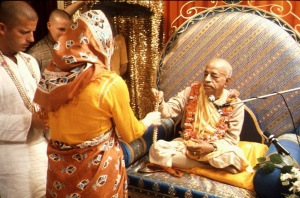SB 9.6.53: Difference between revisions
(Vanibot #0018 edit: make synonym terms in Sanskrit italic in SB - Vanisource) |
(Vanibot #0054 edit - transform synonyms into clickable links, which search similar occurrences) |
||
| Line 23: | Line 23: | ||
<div class="synonyms"> | <div class="synonyms"> | ||
''evam'' | ''[//vanipedia.org/wiki/Special:VaniSearch?s=evam&tab=syno_o&ds=1 evam]'' — in this way; ''[//vanipedia.org/wiki/Special:VaniSearch?s=vasan&tab=syno_o&ds=1 vasan]'' — living; ''[//vanipedia.org/wiki/Special:VaniSearch?s=gṛhe&tab=syno_o&ds=1 gṛhe]'' — at home; ''[//vanipedia.org/wiki/Special:VaniSearch?s=kālam&tab=syno_o&ds=1 kālam]'' — passing away time; ''[//vanipedia.org/wiki/Special:VaniSearch?s=viraktaḥ&tab=syno_o&ds=1 viraktaḥ]'' — became detached; ''[//vanipedia.org/wiki/Special:VaniSearch?s=nyāsam&tab=syno_o&ds=1 nyāsam]'' — in the renounced order of life; ''[//vanipedia.org/wiki/Special:VaniSearch?s=āsthitaḥ&tab=syno_o&ds=1 āsthitaḥ]'' — became situated; ''[//vanipedia.org/wiki/Special:VaniSearch?s=vanam&tab=syno_o&ds=1 vanam]'' — in the forest; ''[//vanipedia.org/wiki/Special:VaniSearch?s=jagāma&tab=syno_o&ds=1 jagāma]'' — he went; ''[//vanipedia.org/wiki/Special:VaniSearch?s=anuyayuḥ&tab=syno_o&ds=1 anuyayuḥ]'' — was followed by; ''[//vanipedia.org/wiki/Special:VaniSearch?s=tat&tab=syno_o&ds=1 tat]-[//vanipedia.org/wiki/Special:VaniSearch?s=patnyaḥ&tab=syno_o&ds=1 patnyaḥ]'' — all his wives; ''[//vanipedia.org/wiki/Special:VaniSearch?s=pati&tab=syno_o&ds=1 pati]-[//vanipedia.org/wiki/Special:VaniSearch?s=devatāḥ&tab=syno_o&ds=1 devatāḥ]'' — because their only worshipable object was their husband. | ||
</div> | </div> | ||
Latest revision as of 16:13, 19 February 2024

His Divine Grace
A.C. Bhaktivedanta Swami Prabhupada
A.C. Bhaktivedanta Swami Prabhupada
TEXT 53
- evaṁ vasan gṛhe kālaṁ
- virakto nyāsam āsthitaḥ
- vanaṁ jagāmānuyayus
- tat-patnyaḥ pati-devatāḥ
SYNONYMS
evam — in this way; vasan — living; gṛhe — at home; kālam — passing away time; viraktaḥ — became detached; nyāsam — in the renounced order of life; āsthitaḥ — became situated; vanam — in the forest; jagāma — he went; anuyayuḥ — was followed by; tat-patnyaḥ — all his wives; pati-devatāḥ — because their only worshipable object was their husband.
TRANSLATION
In this way he passed his life in household affairs for some time, but then he became detached from material enjoyment. To renounce material association, he accepted the vānaprastha order and went to the forest. His devoted wives followed him, for they had no shelter other than their husband.